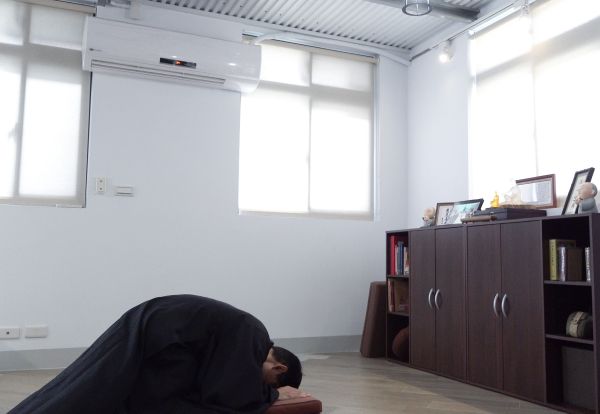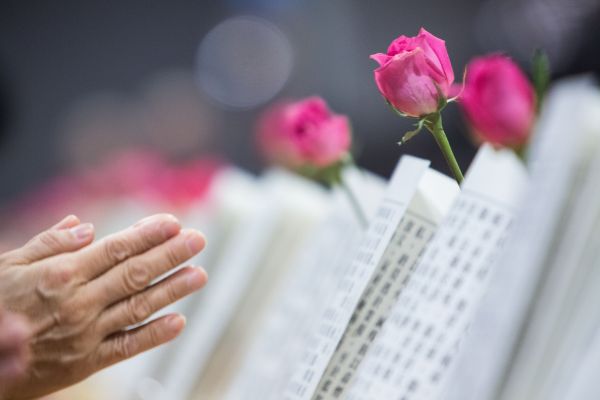Special Topics
Why Should One Practice Repentance Rituals?
Do you face endless vexations which cannot be extinguished? Are you constantly dissatisfied with your daily life and spiritual practice? When faced with life's various trials, monastics always advise people to increase their participation in repentance rituals, in order to feel tranquil and peaceful. Many indeed feel spiritually renewed after participating in repentance rituals. These individuals regain confidence, as well as the strength to renew their daily practice in the face of dissatisfaction and life's various trials. Therefore, they regularly participate in monthly repentance rituals to seek continuous growth.
Although the purified atmosphere of repentance rituals affects every practitioner, can one truly appreciate the meaning of repentance rituals? Besides experiencing the serenity offered by the Dharma assemblies, can one fully comprehend its essence and, furthermore, imbibe it in body and mind with every prostration? Or, does one harbor the attitude of attending temple fairs, and, thus, calculate the benefits of warding off disasters after repentance rituals?

Although the purified atmosphere of repentance rituals affects every practitioner, can one truly appreciate the meaning of repentance rituals? Besides experiencing the serenity offered by the Dharma assemblies, can one fully comprehend its essence and, furthermore, imbibe it in body and mind with every prostration? Or, does one harbor the attitude of attending temple fairs, and, thus, calculate the benefits of warding off disasters after repentance rituals?

Practicing Repentance Rituals Is an Essential Method of Buddhist Practice
Practicing repentance rituals is an important practice method in Chinese Buddhism. Through repentance, practitioners can eliminate karmic obstacles, as well as purify body and mind. The meaning of practicing repentance rituals is not limited to being purified through several hours' participation in Dharma assemblies; more so, the spirit of repentance rituals extends to all of one's daily life. Only through constant self-awareness can the power of practicing repentance rituals fundamentally change our lives.
If the only motive to practice repentance rituals is for personal benefit, or in the hopes of a positive future outcome, then the purification aspect of repentance won't take effect in one's daily life. It's analogous to creating friction with people or offending others in daily life, only to ask the other party to make the greatest concession, rather than feeling true shame and remorse. The spirit of practicing repentance rituals is to face one's faults honestly, and resolve never again to harbor evil intentions.
The Ksitigarbha Bodhisattva Sutra states that "In each and every deed and thought of all sentient beings, there is nothing but Karma, and nothing but Sins." One enters samsara due to karmic attractions. Had one never committed misconducts in previous lives, one would not have entered samsara and suffered. Practicing repentance rituals is precisely the best approach for practitioners to repent and liberate themselves.

Repentance Is an Important Part of Constant Practice in Everyday Life
After all, it is difficult to refrain from making mistakes. Often, we make mistakes unconsciously. Therefore, one doesn't have to wait until they make mistakes to repent. Instead, one should have a sense of shame and repent all the time. Participating in repentance rituals is like bathing oneself in the cool, refreshing water of Dharma. By practicing repentance rituals again and again, the defiled mind returns to its pure self-nature. Only in this way can one receive the coolness and calmness that the Dharma offers.
In his book, Knowing the Path of Learning Buddhism, Master Sheng Yen encouraged us to think of practicing repentance rituals as constant homework that lay practitioners should not miss, even for a single day. "Only by constantly repenting can one continue to correct past misdeeds, conduct good future deeds, and proceed along the path towards Buddhahood. The only ones who know that 'today is right and the past is wrong' are those living in a renewed state every day. It is they who stand the best chance to change their outlook, and are most likely to make the greatest discovery."
Regularly taking part in repentance rituals every month, sparing a few minutes every day for repentance, and reciting <Buddhist Repentance Verses>, would help unload one's mind, give rise to compassionate vows, eliminate vexations, and regain confidence. Let's renew ourselves day by day and embrace a bright future!
Resource:
50 Questions on Repentance Prostration Practice(拜懺50問), Dharma Drum Publishing Corporation
